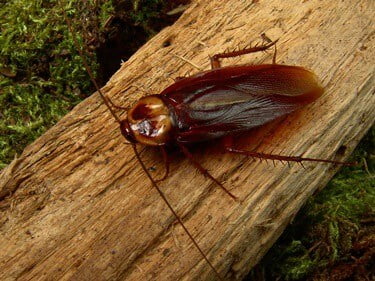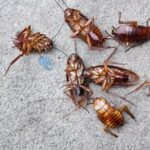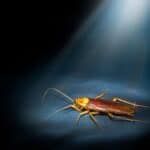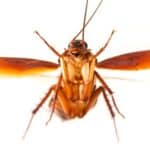You may wonder if those strange nighttime noises are coming from cockroaches. Whether the sounds you hear are due to eating, walking, flying, running, or mating, it seems unlikely that roaches would be completely silent.
Household roaches don’t make much noise, but you may be more aware of those sounds at night. When it’s quiet, you may faintly hear roaches scurrying around furniture, appliances, and wall cavities. Flying can generate a soft buzzing sound, but this is virtually undetectable to humans. You may hear chirping noises when cockroaches are mating or feel threatened. The more cockroaches you have, the more likely you are to detect noise.
Wild roaches use noise as a way to communicate with each other. This can attract mates and warn off predators or rivals. Household roaches, in contrast, will use pheromones to communicate. Everything else they do is largely silent. When people hear ‘cockroach sounds’ at night, they may well be mistaking them for a different type of bug.
Do Cockroaches Make Noise?
Not all cockroaches make noise, but some produce subtle sounds that can be detected when it’s quiet. The wild cockroach may vocalize to ‘talk’ to other roaches, but they aren’t prolific singers or talkers, like crickets.
Roach sounds are soft, so the noise of their surroundings usually drowns them out. You’re unlikely to hear cockroaches unless you’re paying really close attention and know specifically what to listen for.
Do Common House Roaches Vocalize?
The average house roach doesn’t vocalize. There are over 4,000 roach species, yet only 4 species affect human homes regularly. So, non-vocalizing roaches are in the minority.
It’s unknown why household roaches largely lost this ability or failed to develop it. Even so, it doesn’t mean that they’re unable to communicate with others of their species.
Instead, house roaches communicate using pheromones. These are chemicals that act much like hormones. Instead of affecting the individual that produces them, they affect the individual that receives them. Roaches put out these pheromones through their feces. In this way, they can affect the behavior of any roaches that infest that area.
Why Do I Hear Cockroaches At Night?
Darkness doesn’t cause roaches to sing. However, because roaches are nocturnal, you may find the sound is incidental. Roaches will only make sounds when they’re active. They’re most active at night as predators are less of a problem.
If you can detect cockroaches’ near-silent activity, it means you have a large population in your home.
Sounds That Wild Cockroaches Make
Wild roaches can make a wide range of sounds based on their needs.
What Is A Cockroach Stridulation Sound?
Of all the noises wild cockroaches make, stridulation is the most common. Stridulation a sound created during mating. This is accomplished by rubbing body parts together until a noise is created. It’s an open invitation to other roaches. The sound is normally too quiet for humans to detect.
Neither crickets nor roaches rub their legs together. Instead, the cricket rubs its right wing against its left wing. The left wing is covered with ridges. When the right wing’s smooth edge is scraped against the right, the cricket produces the chirping noise it is known for. Roaches mimic this behavior, but with their spiracles.
Spiracles are openings that exist along a roach’s exoskeleton. They are used to take in oxygen, so they serve as lungs. However, they close up to keep out pesticides or water, allowing roaches to avoid drowning or dying due to the ingestion of poisons. By opening and closing these spiracles rhythmically, roaches can generate a soft sound.
Do All Roaches Make Stridulation Sounds?
Despite being a courtship method, not all roaches use stridulation. Instead, this trait is mostly found in some Australian roach species. Soft whistles are created by forcing air through the spiracles, which supposedly help roaches distinguish themselves from other insects.
According to the Journal of Insect Physiology, the stridulation behavior is observed in the speckled roach, Nauphoeta cinerea. These stridulations were composed of short pulses and double chirps that last up to 3 minutes.
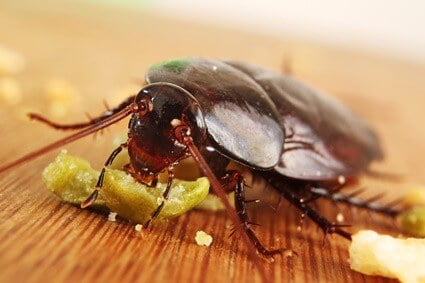
Do Roaches Chirp?
Cockroaches do chirp. However, the sound is just a variation of stridulation, not its own signal. Since it’s quiet, you’ll find that it’s usually overwhelmed by the sounds of other insects. Only other roaches will know the difference.
Do Roaches Hiss?
Like chirping, roaches can hiss by passing air through their spiracles. However, unlike chirping, it’s:
- Not designed for courtship alone.
- Loud and easy for humans or other animals to hear.
- Only found in the Madagascar hissing cockroach.
This hissing noise has been known to startle animals and insects. It’s the only trait that sets the Madagascar roach apart from other species. Its physical appearance is similar to your average household roaches, including:
However, you probably won’t see or hear this roach as they are only found in Madagascar’s forests.
Why Do Roaches Hiss?
A hissing roaches hiss isn’t limited to one meaning. Instead, you’ll find this creature has 3 distinct hisses.
Disturbance Hiss
The disturbance hiss is commonly believed to be a warning that wards off predators. However, according to the Journal of Insect Physiology, researchers are still unsure if it contains nuance.
Aggression Hiss
Only males can make this hissing sound. It’s used during mating season, designed to warn rival cockroaches away from available females. The more powerful the hiss, the more dominance a particular male has in the group.
Female-Attracting Hiss
As the name implies, the female-attracting hiss is used in courting rituals. Males alone create this sound, which is intended to get the attention of possible mates.
Sounds That Household Roaches Make
While household roaches are very quiet, they’re not entirely silent. As nocturnal creatures, you can attempt to hear roach noises at night.
Can You Hear Cockroaches Flying?
Not all roach species can fly, but the kinds found in homes may do so. In fact, the American cockroach has set record-breaking speeds. When in flight, it’s been recorded going as fast as 3.4 miles per hour. With its lightweight body and nimble build, this requires little acceleration.
With speeds like these, the cockroach is bound to make some noise. If you were to listen closely, you might hear the soft fluttering of wings as this cockroach flies. Also, if the roach is knocked onto its back for any reason, it will use its wings to right itself. This may generate a fluttering sound as it opens and closes the wings.
Can You Hear Cockroaches Walking?
While at a normal walking pace, roaches do not make noise. They lack the weight to disturb any surface they walk on. Even family pets with sharp hearing, like cats or dogs, will be unable to detect this. Sadly, you’ll have to rely on physically seeing the roach to notice it.
Can You Hear Cockroach Scurrying?
You can’t hear a walking roach, but those that run or scurry can generate a sound. These creatures are so fast that, in one second, they can cover 50 body lengths. If they were human-sized, that would equate to 200 miles per hour. Even still, a roach’s scurry only makes a soft noise. You may never hear it, but cats or dogs may be able to notice it.
The sound of a scurrying infestation is more likely to be detected by humans. That’s because a large population will find it more difficult to navigate your home without bumping into objects. With especially noisy objects, this scurrying can be easily heard.
Can You Hear Cockroaches Eating?
Roaches are known to eat anything. With their sharp mandibles, these insects can bite through many substances, including some forms of plastic. However, these ‘mouths’ are too small and precise to generate noise. Roaches don’t make munching, crunching, or biting noises.
If you hear a sound, it’s likely to be from the food the roach is eating. Bread bags, paper, or chips may create a small noise. This will still be very quiet, as roaches gnaw off little bits at a time.
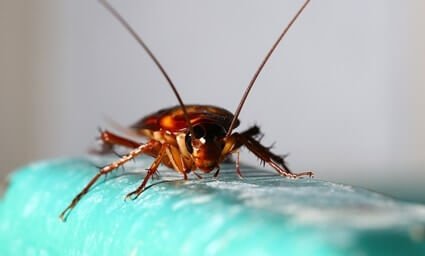
Do Cockroaches Make Noise In Walls?
Roaches may brush against things inside the wall that generate sounds, like insulation paper. However, that’s technically irrelevant because you wouldn’t be able to hear it.
If roaches made noise in your walls, the sound would need to pass through the insulation and drywall. These barriers would negate the noise entirely, so you and even your pets couldn’t detect it.
Even rats, which are much bigger creatures, need to scurry quickly to get noticed. If you hear sounds in your walls, it’s likely to be due to another kind of bug or pest.
Do Roaches Make A Clicking Noise?
It’s a myth that roaches make clicking sounds, but roaches cannot make this sound. Even wild roaches are unable to generate the friction needed for clicking. If you hear clicking noises at night, it’s due to a different insect.
Common culprits for this noise include click beetles, which produce this sound as they flip themselves upright. That’s because, to flip, their spines have to fit into the undersides of their abdomen, creating the noise. While less troublesome than roaches, click beetles are still considered pests, as they can damage plants.
You may be hearing a clicking sound from cicadas and katydids. Cicadas produce the noise by flexing their muscles. This results in its ribs buckling, which produces the noise. Katydids produce noises much like the cricket by rubbing their wings together.
Do Cockroach Noises Mean You Have An Infestation?
It usually takes many cockroaches to generate enough noise for humans to detect. With that said, hearing cockroaches doesn’t mean that you have an infestation. Noise is not a reliable factor for the following reasons:
- Roaches do not make enough noises.
- Whatever noises they make are too soft or happen too rarely.
- Most people are unfamiliar with roach sounds. It’s hard for a non-specialist to identify cockroaches by their noises.
If you hear a noise that you believe is a roach, it probably isn’t one. You can likely hear other bugs or other noises in your home. Cockroaches are not the only nocturnal insect; others produce mating calls exclusively at night.
If you do hear roaches at night, this doesn’t mean that you have a full-blown infestation. Rather, you likely have one or two roaches scurrying around. Of course, there may be roaches living in other parts of your home.
If you hear any bug sounds at night, you should check for other signs. While the sounds of cockroaches may not guide you, there are other ways to determine if you do have a cockroach problem.
